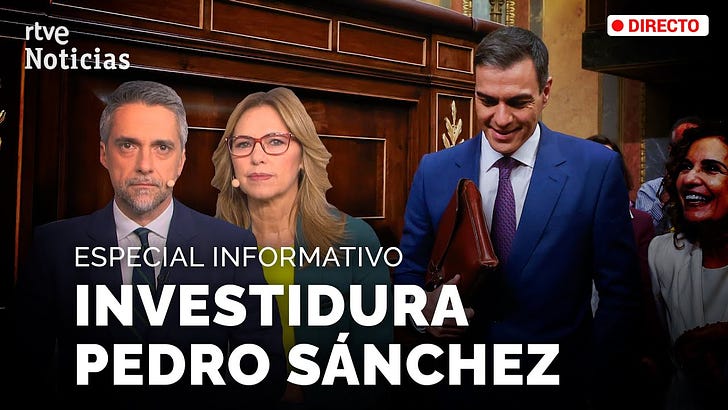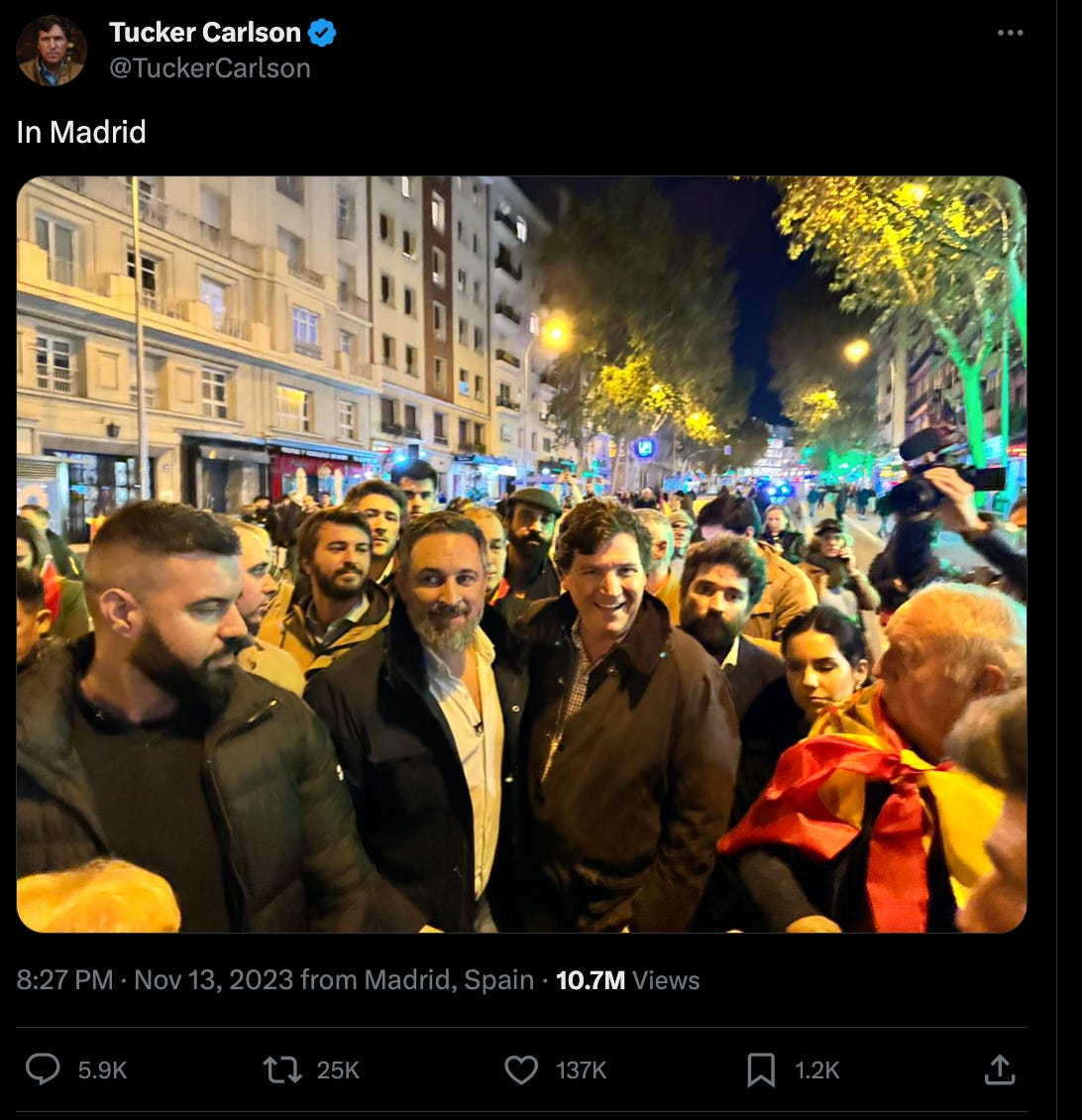🇪🇸 This Week in Spain: Sánchez's Investiture Day
Also: 'Sálvame' is back (kind of) and... is Taylor Swift buying property in Mallorca?
By @IanMount and @AdrianBono | November 16, 2023 | Madrid | Issue #37
🎉 Welcome to The Tapa, an English-language, weekly newsletter about all things Spain!
🥜 This Week in a Nutshell: The big day is finally here. After months of comings and goings, a summer election, palace intrigue, complicated maths and failed investitures, it looks like, in the end, Pedro Sánchez managed to get exactly what he wanted. If all goes according to plan, the caretaker prime minister is on course to secure a new term in a parliamentary vote today.
🙏 Remember that if this email gets truncated at the bottom because it’s too long, just click here to read the rest on Substack.
🙌 But wait, there’s more! The Tapa has its very own LinkedIn page to grow a new community. Please check it out and, if you’re so inclined, follow us here.
🕺If you haven’t subscribed yet, please do so by clicking on the button below.
🫶 And if you already have, please send this newsletter around to your friends and family and help us keep growing.
Four more years
Pedro Sánchez on Course to be Voted Prime Minister
The Big Day. High Noon. The moment we’ve all been waiting for. Take whichever cliche you prefer, that’s what Wednesday was.
At least for Pedro Sánchez, Spain’s caretaker PSOE socialist Prime Minister who had cleared the way to repeat in the country’s top job.
And for Catalan separatists with legal problems, who’d negotiated a deal to get amnesty if Sánchez got his wish.
And for the right-wingers of Hazte Oír driving around Madrid in a bus plastered with an image of Sánchez as Hitler (Nazis were national socialists and Sánchez is a socialist so…get it?) and his party’s initials written as Pedro Sánchez Odia España. If it must be said, Hazte Oír do not like Sánchez or want him in power.
Sánchez’s Big Day—or, rather, the two-day investiture process that will previsiblemente culminate on Thursday in a (close to 100% likely) ‘yes’ vote for a new Sánchez term—in fact began yesterday at high noon in Parliament, with the speaker Francina Armengol reading the King’s proposal of Sánchez as a candidate. And then Sánchez stepped up to the dais to give his Big Speech.
The speech is, in theory, a chance for the candidate to explain his or her program (though in Spain always his to date) and why the MPs should vote for him.
Sánchez did explain some measures his government would put in place in a new term, but really that was the least awaited part of his speech and caused few sparks.
Sánchez said his new government would: a) provide free public transport for minors, young people, and the unemployed; b) maintain reduced IVA on basic foods for six more months; c) raise the income ceiling for people to apply for help paying their mortgages to €38,000; d) remove statutes of limitation on child sexual abuses and create a fund for those abused by the church; e) create a national mental health pact to train more psych professionals and expand treatment; and f) plenty of other smaller and/or less defined changes like creating “cultural rights”, which seems like basically more art everywhere, and blah blah.
It was all pretty palatable for people across the political spectrum—who doesn’t like free stuff and more art?—and complaints were largely limited to casposo grumblings that Sánchez doesn’t have the power to do some of the things and others had already been announced, and it was expensive, and blah blah.
Amnesty! Sánchez took almost an hour and a half to get to the main course, the dish everyone was waiting for (drumroll, please)… the, um, controversial deal his party made with Carles Puigdemont—the former Catalan regional boss who oversaw the illegal independence referendum in 2017 and then self-exiled to a McMansion in the Brussels suburbs—to get the seven votes from Junts, Puigdemont’s party, that Sánchez needs fort re-election.
And Sánchez being the risk-loving pol he is, he did not shy away.
Knowing full well that amnesty for Catalan separatists in itself has little support, Sánchez went for the best defense—that is, a good offense. He went on the attack.
So instead of defending amnesty as a good policy per se, Sánchez framed his agreeing to it as a necessary price to pay to keep right wing nutters like Vox—who would come in on the PP’s coattails—out of power.
“The circumstances are what they are,” Sánchez said, and one had to "make a virtue out of necessity." Plus, considering that, you know, the whole 1O separatist referendum madness happened while the PP was in power (in the body of PM Mariano Rajoy), the PSOE couldn’t exactly do worse: “The PP recipe led to disaster in Catalonia. We are committed to dialogue and forgiveness."
In other words, we had to do this unpleasant thing to avoid a government formed by the PP and the radical right. Which is basically the same argument Sánchez used to get just enough votes on 23J to stop the PP—propped up by and dependent on the far-righties of Vox—from coming to power. The argument in super-basic form: You may not like us, but they are very bad.
It all came back to this touchstone: almost any deal was justifiable in the name of stopping the far right, which is motivated by a distrust of democracy and a dislike of working people.
“Let's not be naive,” Sánchez said. “The PP's problem alongside Vox is not the amnesty, it is that they do not accept the result of the polls. We know that the amnesty matters very little to them. The economic powers that support them know that the amnesty will be good. What the rights do not want is for us to continue improving working conditions, that is why they do not want us to govern.”
Sánchez be blunt: “It is necessary that we continue governing to prevent Spain from retreating in the face of the reactionary wave that is advancing in all countries.”
Beyond that, there was lip service to how amnesty would ease tensions and calm the waters and blah blah blah. “We must bet on coexistence [and approve the amnesty] to consolidate the progress made in these last four years,” Sánchez said.
Following Sánchez’s epic doubling down, it was in-ev-it-a-ble that the level of hostile repartee would soar, and it did. Welcome to Insulting Zingerfest 2023!
First came Feijoo, who, just like Sánchez before him, trotted out election lines past and future.
Feijóo’s were aimed at firing up his electorate at Sánchez’s, um, useful flip-flops on policy and principles when it came to amnesty (he was absolutely against before 23J, and totally for it when he needed Junts votes after). It has, indeed, become a parlor game to list all the times Sánchez and his helpers said they wouldn’t do what they’ve now agreed to do.
“This investiture was born of a fraud," Feijóo said. “The deal brought to Parliament today was not voted on at the polls… Why don't they let Spaniards vote at the polls?"
Sánchez “does not have anyone's support, he has bought it by paying checks that we will all pay,” he added
These are worthwhile points, and some are arguably true. But while having good points and being right will get you a win at debate society, here, in Spain’s hardscrabble political world, you lose. You need to cobble together more MP votes than the other guy, and Feijóo didn’t.
While Feijóo was visibly frustrated with Sánchez, it was no comparison to the speech that Vox leader Santiago Abascal offered when it was his turn. In short, he was livid.
The far-right leader pulled no punches and accused Sánchez of “trying to stage a coup” and compared him to “Chávez, Maduro and Hitler” arguing that they all used their position in power to “break democracy”.
His words were interrupted by Parliament president Francina Armengol, who accused him of going against parliamentary decorum rules and against the “foundations of democracy”, warning him to withdraw his accusations. “This country knows what a coup is,” she said—pointing out to the bullet holes that can still be seen on the Parliament ceiling and referring to the failed coup of 1981.
Abascal refused to take back his words, and Armengol told him the language would be erased from the session’s minutes, to which he responded that such censorship was evidence it was indeed, a coup.
The far-right leader then warned PP leader Feijóo that if his party didn’t oppose the amnesty law in the Senate (where they have a majority) Vox would break up with the center-right and end their coalition governments in several of Spain’s autonomous communities (drama!).
After his speech, and before Pedro Sánchez was able to offer a response, all of Vox’s 33 MPs left the floor in sign of protest (Abascal included).
Later that evening, it was Isabel Díaz Ayuso’s turn to be involved in controversy after she was caught on camera calling Sánchez a “son of a bitch”.
Sanchez mentioned the corruption accusations made against her brother a couple of years ago (a court decided there was no evidence of wrongdoing in 2022). When the camera suddenly cut to her, she could be clearly seen saying “hijo de puta,” which—you guessed it—means the male child of a female dog.
When the media ran to ask her staffers about it, they replied she was just saying “me gusta la fruta” (“I like fruit”) which is a pretty random comment to make. But then someone from her team admitted she had actually insulted Sánchez because he had made an accusation without evidence. “It’s the least he deserves,” they said.
Late in the evening (when everyone was kind of done for the day) it was time for Catalan separatist parties ERC and Junts to speak. And it was awkward as hell, especially for Sánchez.
Neither of them minced words and clearly said this was simply a marriage of convenience. Neither party likes PSOE (or the Spanish government in general) and they both know that without their votes, Sánchez can’t be prime minister. So they decided to have some fun.
Gabriel Rufián from ERC (who loves to troll people in Parliament) warned Sánchez that his party “today has the power to make him do things” and yes, he even mentioned an independence referendum. “Look around,” he told him. “Do you see any alternative to us?”
“Don’t risk it,” he concluded while Sánchez just… sat there.
Then came Miriam Nogueras from Junts, who had a similar message for him and warned that they could withdraw their support “at any time”. “Don’t test your luck,” she warned. Once again, Sánchez just… sat there.
Sánchez was relatively brief and avoided direct confrontation when responding to both of them, saying that he had been “betting on having a dialogue” since he took office in 2018.
Oh, and one last thing: yes, once again there were violent protests outside the PSOE headquarters last night. Some 2,000 people gathered outside the building and some of the most extreme elements present began hurling beer bottles and other objects to the police. The night ended with at least 14 people arrested and nine injured.
🔔 A Message From Our Sponsor
Bucólico Café is a project of connection that was born as a specialty coffee shop.
We value time and understand that it represents both a cycle and an instant—chronology and nostalgia. Bucólico is a space that connects one’s soul with the purity, lightness and beauty of the countryside—while being in the city. Via a cup of coffee, a piece of cake or a song…
Located on Calle de Barbieri 4 — a few blocks from Plaza Chueca — Bucólico reassures the soul with a feeling of home.
Follow Bucólico Café on Instagram.
💬 Five things to discuss at dinner parties this week
1. 🇪🇸 What’s up with the hole in the flag?
The anti-amnesty protests over the last weeks have sported tons of flags. From ones with bulls, to ones spray-painted with slogans, to the “pre-democratic” Franco-era variety to…those with a big hole in the center where the coat of arms would normally be. What gives with the last one?
Hungary 1956? It’s true! It has everything to do with Hungary 1956.
Anti-Soviet. Back in 1956, Hungarians rebelled against their country’s domination by their Soviet overlords. They were, well, put down. Some 2,500 were killed (and 700 Soviet soldiers died) and 200,000 Hungarians fled abroad.
What does this have to do with Spain and amnesty and stuff? Since Hungary’s 1956 put-down, cutting the coat of arms/state seal has become a symbol of a revolution of the people against their government.
“Hole-y” flags were flown in Romania when the people protested again Nicolae Ceauşescu’s dictatorship (the Ceaușescus were later executed after they, um, lost the revolution).
East German protesters did the same in 1989 as they protested for reunification (which they got).
The whole point is to remove the symbol of government (the seal) and leave the symbol of the people—the colors—to propose the people against the government.
Spanish protestors against Sánchez’s amnesty deal are basically playing it like that. The difference between the Spanish protests and those in Hungary, Romania and East Germany? Well, Spain isn’t literally a communist dictatorship.
But the point the protestors are trying to make is that they think Spain is going that way.
Happy times!
2. 🤠 Why’s that guy in Madrid?
Former Fox wunderkind/right-wing Trustafarian Tucker Carlson turned some lots of eyes when he popped up protesting the whole amnesty shitstorm in Madrid this week alongside Vox’s Santiago Abascal (thus answering the age-old question “Which one has a bigger noggin?” — the answer is Tucker).
But…why? Since being ejected by Fox (and to be honest even before), the Swanson Hungry Man pseudo-heir has been on an international brand expansion tour.
Like, how international? Tuckie traveled to Hungary (see above) to interview and praise Viktor Orbán way back in 2021.
Oh, but wait…Argentina! Tucks went to Buenos Aires to interview libertarian/dog-cloner Javier Milei in the run-up to this weekend’s Argentine presidential election.
It’s great that he enjoys traveling but…why Madrid? With the amnesty bill and the holes-in-flags etcetera, Spain may quick become the go-to far-right tourist hot spot.
Tucker came to Madrid to “understand” and “explain” Spain, he told El Confidencial.
One thing he already understood? That he was against the amnesty. As in, “I love Spain and they are trying to steal your country. This is not how a democracy should work. You can't give an amnesty just to get people to vote for you. You have to have the rule of law.”
Tucker is not well-known in Spain. So his wandering around with Abascal led to a lot of “Who is that guy?”
That led to a flurry of articles in the Spanish press about who the hell Tucker was. Take El Diario, which published a story that was, well, just that: Who is Tucker Carlson and why did he appear in the protest in Madrid alongside Santiago Abascal.
We can’t go through the whole story here—it’s a bazillion words long—but El Diario does pick up on one key tenant of Tucker-landia: his promotion of ultraviolet “testicle tanning” as a remedy to low birth rates.
Abascal did not mention if they spoke about that issue.
3. 📺 ‘Salvame’ 2.0 is killing it on Netflix
You probably heard of Sálvame, if you spent enough time in Spain in the last 14 years. If not, well, it’s one of the trashiest, cringiest and most addictive talk/gossip TV shows to ever air in this country. It’s the show no one watched but somehow everyone knew what was happening.
Sálvame featured fist fights, lots of (most certainly scripted) yelling and crying and a bunch of TV commentators discussing Spain’s celebrity and royal news—every freaking afternoon. It’s like if Hello! magazine and TMZ had a baby.
And then—boom! One day, a few months ago, it was announced that it was being canceled. The news was such a shock that the entire nation went into mourning. People (well, reality show stars) actually rent their clothes. How was this possible? What would we watch now? How would we survive?
Enter Netflix, which offered the show’s most high-profile commentators a chance to return in the shape of an “anti-reality/travel show” that would appear on the streaming platform to ease the pain for those of us who missed it.
The show is now the most watched show on Netflix Spain and trust us, if you never saw Sálvame before, you should skip it. Not only you will not understand what the hell you’re watching, you will also find it extremely unfunny because these are people that mean nothing to you.
However, if you know the names María Patiño, Kiko Matamoros, Terelu, or Lydia Lozano, then drop what you’re doing and go to your nearest TV now.
The show admittedly struggles to find its footing over the first few hours. The stars of Sálvame are put on a plane and sent to Miami, where they participate in a series of tests that don’t really make much sense.
But things start to get interesting once the cast starts doing what they do best on national television: fighting. The (possibly scripted) yelling and crying starts in episode 2 after they all start attacking each other while telling the cameras that they don’t have a clear idea of what they are a doing there.
But that is exactly what this show is about. It’s about taking these eight highly dysfunctional people who call each other “family” and putting them in situations that don’t make any sense (like visiting a televangelist’s church, hanging out with crocodiles in the Florida everglades and then just showing them arguing inside a van while they are traversing the streets of Miami).
If you want to understand a bit more about Spanish pop culture, go for it. Don’t try to understand, just watch. And a few weeks from now, someone will send you a meme featuring Belén Esteban (the self-professed “queen of the people” and quite possibly the biggest star of the show) and you will get it.
4.🏳️🌈 The LGBT community is up in arms against the Ayuso government
The LGBT community in Madrid is up in arms over the regional government’s decision to introduce two bills last week that seek to amend two laws passed in 2016 that protect the rights of transgender and LGBTQ+ individuals.
The amendments are spearheaded by PP’s regional president Isabel Díaz Ayuso who said she would make the changes during her previous administration (back when she was governing in coalition with Vox, who wanted a full repeal of the bills) and felt the LGBTQ+ laws were “excessively ideological, questionable in some areas and inefficiently written”.
The changes say that trans minors will only be able to start their treatment after being examined by a pediatrician, followed by assessment “by a mental health professional”.
Madrid will also abolish the burden of proof reversal, which forces people accused of discriminating against trans people to prove their innocence.
It will also repeal the right to the recognition of freely expressed gender identity, as well as the “free development of personality and being treated in accordance with gender identity”.
Recognition of the trans community within educational institutions and administration will be diluted, and the specific sanctioning code for infractions that violate the rights of trans and intersex individuals will be eliminated.
The amendments also eliminate wording that forces the Madrid government to develop "active policies to support and provide visibility to legally constituted LGTBI associations and organizations that carry out educational activities to promote non-discrimination based on sexual orientation and gender identity or expression”. (Now it will be up to “specialized and professional personnel”).
It’s also says it’s no longer mandatory for school curricula to include this type of content.
The Madrid government says these changes are being made to “provide greater clarity and legal certainty, as well as to eliminate certain aspects such as shifting the burden of proof without diminishing the guarantee and protection of the rights of transgender and LGBTQ+ individuals".
It adds that “these measures restore the central role of teachers, specialists, and professionals, adhering to the educational freedom outlined in Article 27 of the Constitution”.
These changes weren’t welcomed by the LGBT community, especially in a city (and a country) that ranks really high when it comes to acceptance of sexual diversity. On Monday, over 1,000 people gathered at the Puerta del Sol in downtown Madrid to demand that the laws remain untouched and prevent the measure from moving forward.
Senator Carla Antonelli from leftist Más Madrid, who is transgender, attended the demonstration and said she felt "shaken" by the government’s decision, criticizing Ayuso for making Madrid "the country's first capital to regress in established rights."
Ayuso is saying in the meantime that people criticizing the move “haven’t read the new bill” and insists that it “doesn’t take away a single right”.
With these changes, she says, "medical professionals, psychologists, teachers, judges, and specialized individuals with legal and scientific rigor who were sidelined” will now “also have the power to decide on this."
Protests will likely continue in the coming days.
5. 👩🏼 Taylor Swift wants to buy a place in Mallorca, maybe
OK, there is literally zero evidence that this is true, but the story has cause quite a commotion in the local swifties community and who are we to shatter their dreams?
The English-language newspaper Majorca Daily Bulletin reported on Monday that pop singer/21st century phenomenon/world economic savior Taylor Swift was “house hunting” in Mallorca and maybe also near Barcelona. The source? British tabloid The Sun, who published an article last weekend saying that Swift was browsing through European mansions. So, like, a dubious tabloid as the source. How could this go wrong?
The Sun reports that a “Portugal-based realtor was contacted recently by (Swift’s) entourage to scope out palatial properties” in Morocco, Portugal and Spain.
Her Highness has allegedly been shown dozens of properties (again, no way to verify this), including in Casteldelfells, Barcelona and Mallorca. The last option has caused a whirlwind on social media, as the largest island of the Balearic archipelago is already a hotspot for Hollywood celebrities like Michael Douglas, Brad Pitt, Richard Branson and Catherine Zeta Jones who own property there (CZJ admittedly is married to Michael Douglas which could explain them both being on the list).
The Sun says some of the options there are an $8-million villa near Son Servera and another one in Port Adriano that “only” goes for $10 million. These include the usual things you can find in anyone’s home, such as a saltwater pool, a garage for seven cars, an outdoor kitchen, a sauna and a cinema.
Turns out that Tay-Tay, according to the Mallorca daily, visited the island earlier this year to attend the wedding of actress Joey King, who married film director Steven Piet in La Fortalesa in Puerto Pollensa. And then maybe she liked it?
Not only that, the same daily also says that Angelina Jolie may be looking to buy property there (again, no source mentioned).
If confirmed, it’s clear evidence of Mallorca hotness—that not only has it become the new place to be for the rich and famous, but it’s also becoming a must-visit place for American tourists.
This is something that the island welcomes, as tourists from the U.S. seem to spend twice as much as Germans and British tourists. And fortunately for the island’s economy, they love it. And they apparently vomit less than the Brits.
Mallorca has seen an explosion in tourism, to the point that last August it broke the record for number of people on the island on the same day (2.1 million) and many of the beaches were at capacity this summer. So maybe instead of more tourists, they’d just like to replace the old ones with new one who spend more.
In fact, the most recent U.S. flights to Mallorca have been so successful that United Airlines plans to increase the capacity of its planes on the New York-Palma flight by 12% next season.
The airline will continue to operate three weekly direct flights between May 25 and September 25 in 2024, but United has told the Mallorca Daily Bulletin that if they continue to be so popular those dates may be expanded in 2025.
Oh, and there’s even talk of having direct U.S.-Mallorca flights all year.
If you’re thinking of buying property there, now is the time! Next thing you know, it will become the new Williamsburg and a Cafe Latte will cost €18. Hurry!
🙏 Before you go, please remember to share this newsletter with your friends on social media. The more we grow, the more information we’ll be able to offer each week.
We’ll be back next week with more.









